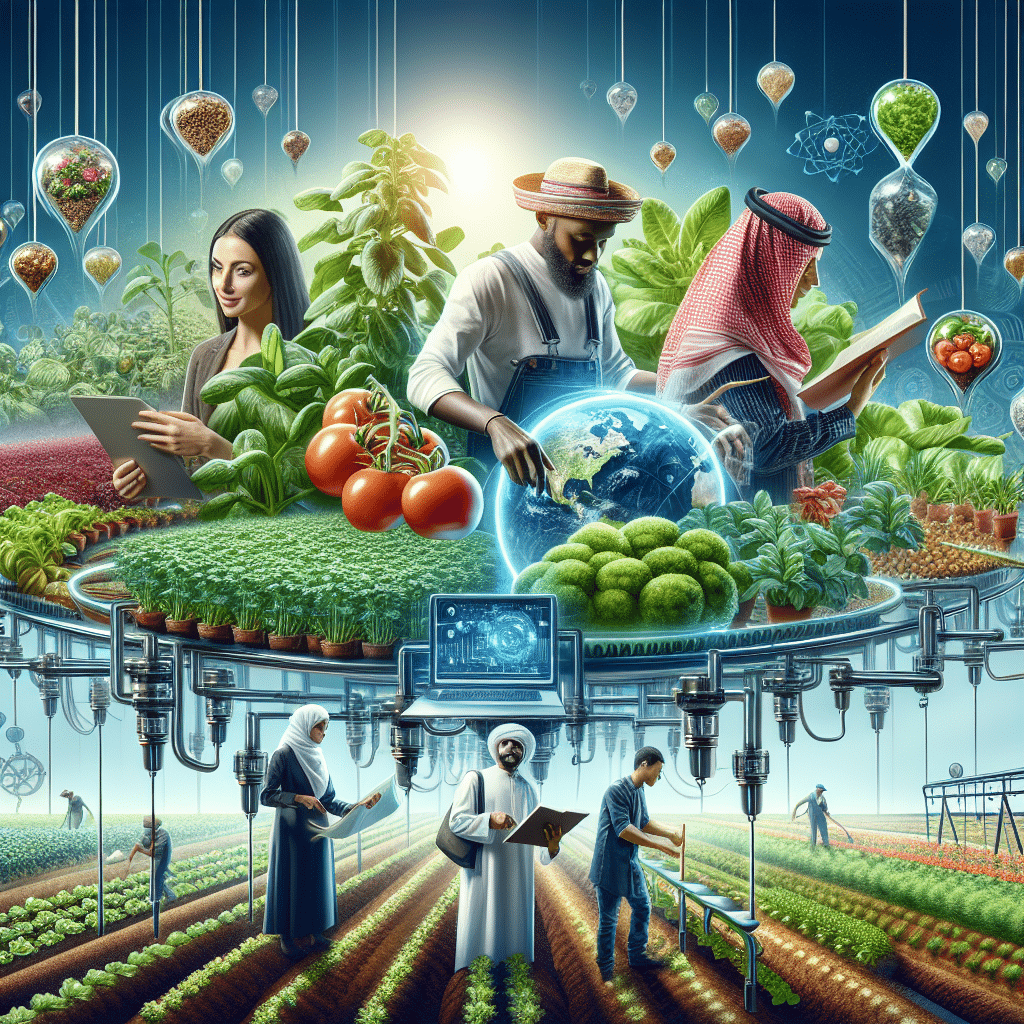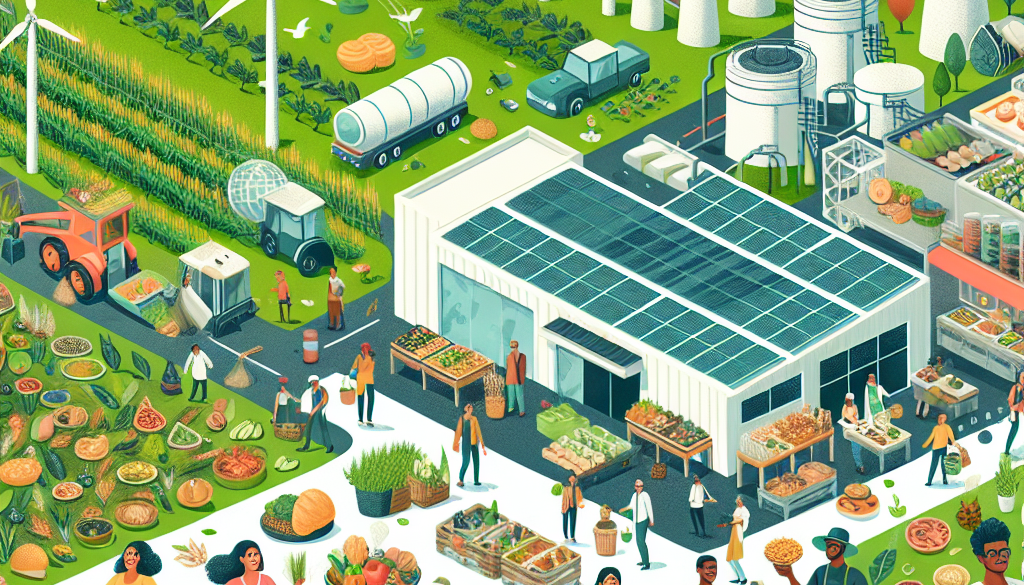Exploringthe Opportunities for Sustainability in the Food Industry
-
Table of Contents
- Sustainability in the Food Industry: Opportunities and Innovations
- The Urgency for Sustainable Practices in Food Production
- Opportunities for Sustainable Agriculture
- Reducing Food Waste Through Innovation
- Advancements in Packaging for Sustainability
- Plant-Based Alternatives and Cellular Agriculture
- Energy Efficiency and Renewable Energy in Food Processing
- Water Stewardship in the Food Industry
- Local and Urban Farming Initiatives
- Conclusion: Embracing Sustainability as the Path Forward
- ETprotein: Leading the Way with Sustainable Protein Products
Sustainability in the Food Industry: Opportunities and Innovations

The food industry is at a critical juncture where the demand for sustainable practices is no longer a choice but a necessity. With the global population projected to reach 9.7 billion by 2050, the pressure on food systems to produce more with less is immense. This article explores the myriad opportunities for sustainability within the food industry, highlighting innovative approaches and the potential benefits of embracing eco-friendly practices.
The Urgency for Sustainable Practices in Food Production
Current food production methods are often resource-intensive and environmentally damaging. The Food and Agriculture Organization (FAO) estimates that agriculture is responsible for 70% of water use and contributes to 30% of global greenhouse gas emissions. The need for change is not only environmental but also economic, as sustainable practices can lead to cost savings and new market opportunities.
Opportunities for Sustainable Agriculture
- Regenerative Agriculture: This approach focuses on restoring soil health, increasing biodiversity, and improving the water cycle. Techniques such as crop rotation, cover cropping, and reduced tillage can sequester carbon and enhance soil fertility.
- Precision Farming: Leveraging technology like GPS, drones, and IoT devices can optimize resource use and reduce waste by providing precise data for planting, fertilizing, and harvesting.
- Organic Farming: By avoiding synthetic pesticides and fertilizers, organic farming can reduce environmental toxins and promote ecological balance.
Reducing Food Waste Through Innovation
Approximately one-third of all food produced globally is wasted, according to the United Nations. Addressing this issue is crucial for sustainability. Innovations such as improved storage technologies, supply chain optimization, and consumer education campaigns can significantly reduce food waste.
Advancements in Packaging for Sustainability
Eco-friendly packaging solutions are vital in reducing the food industry’s environmental footprint. Biodegradable materials, edible packaging, and designs that extend shelf life are some of the advancements that can minimize waste and pollution.
Plant-Based Alternatives and Cellular Agriculture
The rise of plant-based diets and cellular agriculture offers a sustainable alternative to traditional animal farming, which is resource-intensive and a major contributor to greenhouse gas emissions. Companies are now producing meat, dairy, and eggs using plant-based ingredients or cultured cells, with a much lower environmental impact.
Energy Efficiency and Renewable Energy in Food Processing
Food processing facilities can become more sustainable by improving energy efficiency and switching to renewable energy sources. This not only reduces carbon emissions but can also lead to significant cost savings in the long term.
Water Stewardship in the Food Industry
Implementing water-saving technologies and practices in agriculture and food processing can help preserve this precious resource. Techniques such as drip irrigation and water recycling can dramatically reduce water usage.
Local and Urban Farming Initiatives
Local and urban farming reduces the distance food travels from farm to table, cutting transportation emissions and supporting local economies. Urban agriculture also utilizes space efficiently through vertical farming and hydroponics.
Conclusion: Embracing Sustainability as the Path Forward
The opportunities for sustainability in the food industry are vast and varied. From regenerative agriculture to innovative packaging, each initiative contributes to a more sustainable and resilient food system. By adopting these practices, the industry can meet the growing demand for food while protecting the environment and ensuring economic viability.
ETprotein: Leading the Way with Sustainable Protein Products
ETprotein is at the forefront of providing sustainable protein solutions that cater to the evolving needs of the food industry. Their range of organic bulk vegan proteins and L-(+)-Ergothioneine (EGT) products are non-GMO, allergen-free, and boast a neutral taste, making them ideal for various applications in food and beverage, sports nutrition, and health and wellness products.
By choosing ETprotein’s sustainable protein options, businesses can contribute to a more sustainable food system while offering consumers high-quality, eco-friendly products. For more information or to sample their products, please contact ETprotein and email sales(at)ETprotein.com today.
About ETprotein:
ETprotein, a reputable protein and L-(+)-Ergothioneine (EGT) Chinese factory manufacturer and supplier, is renowned for producing, stocking, exporting, and delivering the highest quality organic bulk vegan proteins and L-(+)-Ergothioneine. They include Organic rice protein, clear rice protein, pea protein, clear pea protein, watermelon seed protein, pumpkin seed protein, sunflower seed protein, mung bean protein, peanut protein, and L-(+)-Ergothioneine EGT Pharmaceutical grade, L-(+)-Ergothioneine EGT food grade, L-(+)-Ergothioneine EGT cosmetic grade, L-(+)-Ergothioneine EGT reference grade and L-(+)-Ergothioneine EGT standard. Their offerings, characterized by a neutral taste, non-GMO, allergen-free attributes, with L-(+)-Ergothioneine purity over 98%, 99%, cater to a diverse range of industries. They serve nutraceutical, pharmaceutical, cosmeceutical, veterinary, as well as food and beverage finished product distributors, traders, and manufacturers across Europe, USA, Canada, Australia, Thailand, Japan, Korea, Brazil, and Chile, among others.
ETprotein specialization includes exporting and delivering tailor-made protein powder and finished nutritional supplements. Their extensive product range covers sectors like Food and Beverage, Sports Nutrition, Weight Management, Dietary Supplements, Health and Wellness Products, and Infant Formula, ensuring comprehensive solutions to meet all your protein needs.
As a trusted company by leading global food and beverage brands and Fortune 500 companies, ETprotein reinforces China’s reputation in the global arena. For more information or to sample their products, please contact them and email sales(at)ETprotein.com today.














